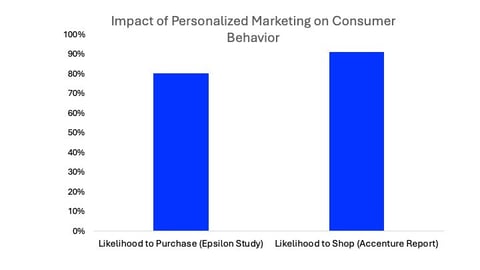
Generative AI is ushering in a new era of personalization in marketing. Envision having the capability to anticipate your customers' needs before they even articulate them. That encapsulates the power of generative AI. By harnessing this advanced technology, businesses can gain precise customer insights, thereby creating highly personalized experiences that resonate on a deeper level.
This post will explore how generative AI transforms marketing strategies and enhances customer engagement, positioning your brand not just as a participant but as a leader in the digital age.
Introduction to Generative AI
Generative AI distinguishes itself from traditional AI by not merely analyzing data but also by generating new content. Utilizing sophisticated algorithms, generative AI can produce text, images, and predictive models based on input data. This capability marks a significant advancement, promising to revolutionize marketing practices.
Think of AI as a digital creator. It processes data such as customer behaviors, preferences, and interactions to create personalized content that meets customer requirements. Whether it's crafting email campaigns or offering tailored product suggestions, generative AI is revolutionizing how brands communicate.
The importance of this technology cannot be emphasized enough. In today's landscape, personalization is key. Customers now expect brands to understand their needs and provide customized experiences. Generative AI not only fulfills these expectations but also goes above and beyond by accurately predicting customer preferences. It unlocks insights that were previously unimaginable, enabling an approach to engaging with customers.
As this technology continues to evolve, its impact on marketing will only intensify. Brands that adopt generative AI today will lead this transformation, gaining a competitive advantage through the delivery of highly personalized, engaging experiences that foster loyalty and drive growth.
So, how can your brand leverage generative AI to gain these insights and create personalized experiences? Let us delve deeper into its applications and examine how it can reshape your marketing strategies.
The Personalization Imperative
Personalization is no longer optional; it's a marketing necessity. Studies show that personalized marketing significantly boosts customer engagement and sales. For instance, according to Epsilon, 80% of consumers are more likely to make a purchase when brands offer personalized experiences.
Generative AI's Role in Enhancing Customer Insights
Generative AI processes vast datasets to uncover deep customer insights. It can analyze purchase history, browsing behavior, and social media interactions to predict customer needs and preferences. This level of analysis was previously unattainable with traditional methods.
Applications of Generative AI in Personalization
Generative AI has practical applications in various areas:
- Personalized content creation: AI can generate tailored content for individual customers, enhancing engagement.
- Targeted advertising: AI creates highly specific ads based on customer behavior and preferences.
- Customized product recommendations: AI suggests products that fit individual customer profiles, increasing conversion rates.
Several tools and platforms leverage generative AI for these purposes. For example, IBM Watson and Adobe's Sensei offer advanced AI-driven personalization capabilities.
Generative AI Success Stories
Netflix: Personalized Viewing Experience
Consider Netflix. By leveraging advanced AI, Netflix analyzes user viewing habits to recommend shows and movies tailored to individual preferences. This approach has significantly improved user engagement and satisfaction. According to Netflix, over 80% of the content watched on the platform is based on algorithmic recommendations. Another example is Amazon, which uses AI to provide personalized shopping experiences, boosting sales and customer loyalty.
Amazon: Custom Shopping Experiences
Amazon employs AI to create personalized shopping experiences. By analyzing user behavior and preferences, Amazon’s AI algorithms recommend products that fit individual customer profiles. This not only enhances the shopping experience but also significantly increases conversion rates and customer loyalty.
Implementing generative AI isn't without challenges. Data privacy concerns are paramount, requiring robust security measures. High-quality data is also essential for effective AI implementation. Companies must invest in data cleaning and integration to ensure accuracy.
Challenges and Considerations
Best practices for overcoming these challenges include:
- Implementing strict data privacy protocols
- Using comprehensive data integration and management tools
- Continuously training AI models with up-to-date data
Future Trends
The future of generative AI in personalization looks promising. Emerging technologies like Web3 and XR will likely integrate with AI, offering even more personalized and immersive experiences. For instance, virtual reality could provide personalized virtual shopping environments, enhancing the customer experience.
Final Thoughts
Generative AI is a game-changer for marketing personalization. By leveraging this technology, businesses can gain deeper customer insights and create bespoke brand experiences that resonate on a personal level. This approach not only enhances customer engagement but also ensures brands remain competitive in an increasingly digital and data-driven marketplace.
Generative AI is here to stay. So, how can you stand out? By integrating this technology into your marketing strategy, you can offer unparalleled personalization and engagement, driving your brand into the future. What does this mean for your brand? It means being future-ready, competitive, and highly relevant in a digital world.
Embrace the power of generative AI and transform your customer insights today.
Recent Posts
Posts by Topics
- Brand Strategy (57)
- Brand Strategy Consulting (28)
- Brand Differentiation (27)
- Customer Experience (24)
- Brand Positioning (22)
- Marketing Strategy (9)
- Brand Extension Strategy (8)
- Customer Behavior (8)
- Brand Architecture Strategy (7)
- Brand Extension (7)
- Brand Growth (7)
- Brand Portfolio & Architecture (7)
- Brand Purpose (7)
- Brand Value Proposition (7)
- Brand Engagement (6)
- Brand Portfolio Strategy (6)
- Brand Storytelling (6)
- Rebranding Strategy (6)
- Brand Awareness (5)
- Brand Image (5)
- Branding (5)
- Rebranding (5)
- Technology (5)
- B2B Brand Strategy (4)
- Brand Experience (4)
- Value Proposition (4)
- Brand Extendibility (3)
- Brand Metrics (3)
- Brand Repositioning (3)
- Corporate Branding (3)
- Differentiation Strategy (3)
- Measurement & Metrics (3)
- Brand Engagement Strategy (2)
- Brand Portfolio (2)
- Brand Promise (2)
- Brand Voice (2)
- Digital Marketing (2)
- Digital and Brand Experience (2)
- Employee Brand Engagement (2)
- Brand Architecture (1)
- Brand Development (1)
- Brand Equity (1)
- Brand Identity (1)
- Brand Measurement (1)
- Brand Name (1)
- Brand Strategy Consultants (1)
- Brand Strategy Firms (1)
- Digital Strategy (1)
- Internal Branding (1)
- Messaging (1)


